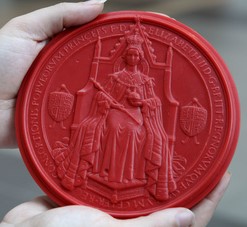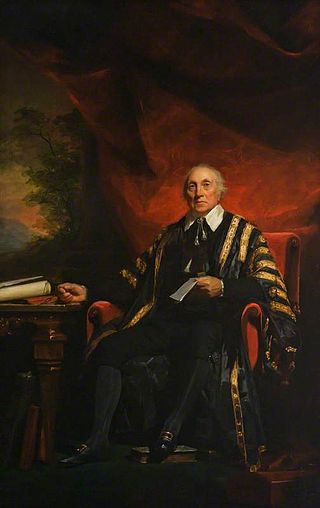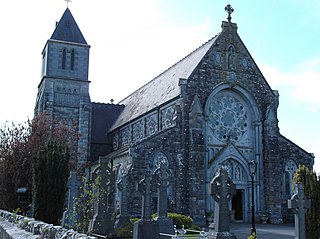Related Research Articles

The Lord Chancellor, formally titled Lord High Chancellor of Great Britain, is the highest-ranking traditional minister among the Great Officers of State in Scotland and England in the United Kingdom, nominally outranking the prime minister. The lord chancellor is appointed by the sovereign on the advice of the prime minister. Prior to the union of England and Scotland into the Kingdom of Great Britain, there were separate lord chancellors for the Kingdom of England and the Kingdom of Scotland; there were Lord Chancellors of Ireland until 1922.

The Court of Session is the supreme civil court of Scotland and constitutes part of the College of Justice; the supreme criminal court of Scotland is the High Court of Justiciary. The Court of Session sits in Parliament House in Edinburgh and is both a trial court and a court of appeal. Decisions of the court can be appealed to the Supreme Court of the United Kingdom, with the permission of either the Inner House or the Supreme Court. The Court of Session and the local sheriff courts of Scotland have concurrent jurisdiction for all cases with a monetary value in excess of £100,000; the plaintiff is given first choice of court. However, the majority of complex, important, or high value cases are brought in the Court of Session. Cases can be remitted to the Court of Session from the sheriff courts, including the Sheriff Personal Injury Court, at the request of the presiding sheriff. Legal aid, administered by the Scottish Legal Aid Board, is available to persons with little disposable income for cases in the Court of Session.

A privy seal is the personal seal of a reigning monarch, used to authenticate official documents of a personal nature, in contrast to a great seal, which is used for documents of greater importance.
The Society of Writers to His Majesty's Signet is a private society of Scottish solicitors, dating back to 1594 and part of the College of Justice. Writers to the Signet originally had special privileges in relation to the drawing up of documents required to be signeted, but these have since disappeared and the Society is now an independent, non-regulatory association of solicitors. The Society maintains the Category A listed Signet Library, part of the Parliament House complex in Edinburgh, and members of the Society are entitled to the postnominal letters WS.

The Lord Justice Clerk is the second most senior judge in Scotland, after the Lord President of the Court of Session.

The office of Lord Clerk Register is the oldest surviving Great Officer of State in Scotland, with origins in the 13th century. It historically had important functions in relation to the maintenance and care of the public records of Scotland. Today these duties are administered by the Keeper of the National Records of Scotland and the Keeper of the Registers of Scotland.

The Great Seal of Scotland is a principal national symbol of Scotland that allows the monarch to authorise official documents without having to sign each document individually. Wax is melted in a metal mould or matrix and impressed into a wax figure that is attached by cord or ribbon to documents that the monarch wishes to make official. The earliest seal impression, in the Treasury of Durham Cathedral, is believed to be the Great Seal of Duncan II and dates to 1094.

In Scotland a sheriff principal is a judge in charge of a sheriffdom with judicial, quasi-judicial, and administrative responsibilities. Sheriffs principal have been part of the judiciary of Scotland since the 11th century. Sheriffs principal were originally appointed by the monarch of Scotland, and evolved into a heritable jurisdiction before appointment was again vested in the Crown and the monarch of the United Kingdom following the passage of the Heritable Jurisdictions (Scotland) Act 1746.

Lord Frederick Campbell was a Scottish nobleman and politician. He was Lord Clerk Register of Scotland, 1768–1816; Member of Parliament (MP) for Glasgow Burghs (1761–1780) and for Argyllshire (1780–1799).

Registers of Scotland (RoS) is the non-ministerial department of the Scottish Government responsible for compiling and maintaining records relating to property and other legal documents. They currently maintain 20 public registers. The official responsible with maintaining the Registers of Scotland is the Keeper of the Registers of Scotland. By ex officio, the Keeper of the Registers of Scotland is also the Deputy Keeper of the Great Seal of Scotland. The Keeper of the Registers of Scotland should not be confused with the Keeper of the Records of Scotland.

The Clerk of the Crown in Chancery in Great Britain is a senior civil servant who is the head of the Crown Office.
A chancery or chancellery is a medieval writing office, responsible for the production of official documents. The title of chancellor, for the head of the office, came to be held by important ministers in a number of states, and remains the title of the heads of government in modern Germany and Austria. Chancery hand is a term for various types of handwriting associated with chanceries.

The Court of the Lord Lyon is a standing court of law, based in New Register House in Edinburgh, which regulates heraldry in Scotland. The Lyon Court maintains the register of grants of arms, known as the Public Register of All Arms and Bearings in Scotland, as well as records of genealogies.

Thomas Cantock, Quantock or Cantok was an English-born cleric and judge in medieval Ireland, who held the offices of Bishop of Emly and Lord Chancellor of Ireland.
National Records of Scotland is a non-ministerial department of the Scottish Government. It is responsible for civil registration, the census in Scotland, demography and statistics, family history, as well as the national archives and historical records.

The judiciary of Scotland are the judicial office holders who sit in the courts of Scotland and make decisions in both civil and criminal cases. Judges make sure that cases and verdicts are within the parameters set by Scots law, and they must hand down appropriate judgments and sentences. Judicial independence is guaranteed in law, with a legal duty on Scottish Ministers, the Lord Advocate and the Members of the Scottish Parliament to uphold judicial independence, and barring them from influencing the judges through any form of special access.
Robert Sutton was an Irish judge and Crown official. During a career which lasted almost 60 years he served the English Crown in a variety of offices, notably as Deputy to the Lord Chancellor of Ireland, Chief Baron of the Irish Exchequer, Master of the Rolls in Ireland, and Deputy Treasurer of Ireland. A warrant dated 1423 praised him for his "long and laudable" service to the Crown.
The Clerk of the Crown and Hanaper was a civil servant within the Irish Chancery in the Dublin Castle administration. His duties corresponded to the offices of Clerk of the Crown and Clerk of the Hanaper in the English Chancery. Latterly, the office's most important functions were to issue writs of election to the Westminster Parliament, both for the Commons and for Irish representative peers in the Lords.
The Crown Office, also known as the Crown Office in Chancery, is a section of the Ministry of Justice. It has custody of the Great Seal of the Realm, and has certain administrative functions in connection with the courts and the judicial process, as well as functions relating to the electoral process for House of Commons elections, to the keeping of the Roll of the Peerage, and to the preparation of royal documents such as warrants required to pass under the royal sign-manual, fiats, letters patent, etc. In legal documents, the Crown Office refers to the office of the Clerk of the Crown in Chancery.

In the United Kingdom, the Great Officers of State are traditional ministers of the Crown who either inherit their positions or are appointed to exercise certain largely ceremonial functions or to operate as members of the government. Separate Great Officers exist for England and Wales, Scotland, and formerly for Ireland, though some exist for Great Britain and the United Kingdom as a whole.
References
- ↑ Reorganisation of Offices (Scotland) Act 1928, section 7.
- ↑ Bell, Robert (1826). Dictionary of the Law of Scotland.
- ↑ "The Chancery pre-1707". The National Archives of Scotland . National Records of Scotland . Retrieved 27 July 2014.